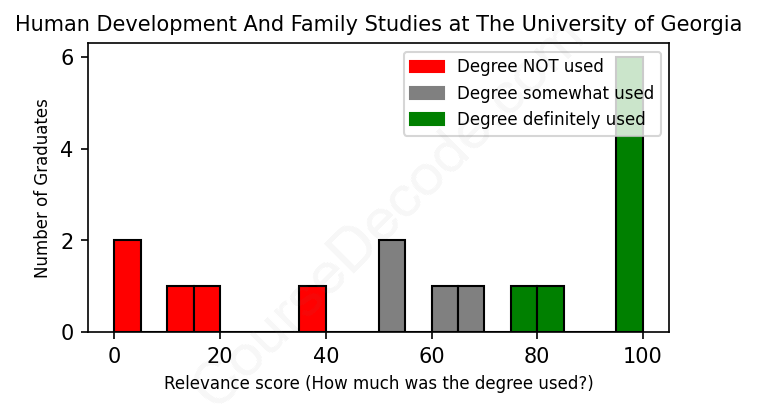
First, some facts. Of the Human Development And Family Studies graduates from The University of Georgia we've analyzed , here's how many have used (or NOT used) their degree in their career:

These are estimates based on AI analysis of 17 LinkedIn profiles (see below).
The verdict? Below average. Overall, with an average relevance score of 61%, Human Development And Family Studies graduates from The University of Georgia have a lower likelihood (-6%) of finding work in this field compared to the average graduate across all fields:
And for comparison, here's the chart for all profiles we've looked at across all degrees.
Also, after graduating, 52% of these graduates have pursued further education other than another Bachelor's degree (such as a Masters degree or other), compared to the average across all profiles of 35%. This suggests you may need more than just a Bachelors degree to be competitive as a Human Development And Family Studies graduate.
See the details:
|
Relevance score: 50% We think this person has gone into a career only somewhat relevant to their degree. We think this person has gone into a career only somewhat relevant to their degree.
DEGREE INFOGraduated in 2022 from The University of Georgia with a Bachelor's degree in Human Development And Family Studies. No other secondary education since. JOB HISTORY SINCE GRADUATIONShadowing SPRING HILL REGIONAL HOSPITAL Aug 2022 - Aug 2022 Sales Consultant  Enovis Feb 2023 - Present ABOUTI am a very faith based, driven, determined, career minded individual that is very well respected by the communities that I am involved in. I graduated from the University of Georgia in December 2022 with a degree in Human Development and Family Science. |
The top 10 most common jobs done by the graduates we've analyzed (ranked most common to least) are:
Based on the LinkedIn profiles analyzed, graduates from the University of Georgia with a degree in Human Development and Family Studies have pursued a wide array of jobs. The most common roles include therapists, mental health professionals, and various positions in healthcare, like psychologists and child life specialists. These positions typically align closely with the core principles of their degree, focusing on understanding family dynamics, child development, and providing support in therapeutic settings. On the other hand, there are several graduates who have taken on roles that are not directly related, such as event coordinators or marketing roles, where the skills gained from their degree may not necessarily come into play on a daily basis.
Overall, while many graduates have managed to secure positions that utilize their knowledge of human development and family studies effectively, a significant number have also ventured into fields that barely touch upon their academic background. So, it’s a bit of a mixed bag! Some have found their dream roles that are perfectly tailored to their studies, while others have ended up in job markets that do not make full use of their degrees. It just shows how diverse career paths can be, even for those studying a specialized field like Human Development and Family Studies.
Here is a visual representation of the most common words in job titles for Human Development And Family Studies graduates (this is across all Human Development And Family Studies graduates we've analyzed, not just those who went to The University of Georgia):

When looking at the career trajectories of those who graduated with a degree in Human Development and Family Studies from The University of Georgia, it becomes clear that many of them have pursued paths quite relevant to their studies. For their first jobs post-graduation, many graduates have taken roles in social services, mental health, administrative positions within organizations that cater to family and child needs, or as therapists. Roles such as Couple and Family Therapy Extern and Administrative Assistant show a focus on supporting individuals and families, which aligns well with their educational background. Some graduates also enter fields that are tangentially related, like marketing and operations within family-focused companies, which illustrates the versatility of their degree.
If we look at where these professionals end up five to ten years later, there’s a mix but a lot of positive movement in terms of career advancement. Many who started in entry-level roles in therapy or social services have moved up to licensed therapist positions or managerial roles in similar organizations, showing a commitment to their field. On the other hand, some have ventured into careers less directly related to Human Development, like marketing or project management, suggesting that not everyone sticks strictly to the path of social services or therapy. Overall, while there is a range of outcomes, a good number of graduates appear to find fulfilling careers that utilize the skills they developed during their studies, contributing to meaningful work in human development or related areas.
Honestly, a Bachelor’s degree in Human Development and Family Studies (HDFS) at the University of Georgia isn't overly difficult compared to some other majors, but it does have its challenges like any degree. You’ll dive into subjects like psychology, sociology, and human development, which can be super interesting but may require some solid reading and writing skills. The coursework often involves group projects and presentations, which can be both fun and a bit stressful if you're not used to teamwork. If you’re passionate about understanding families and human relationships, you might find it more engaging than tough. So, while it has its hard parts, if you stay organized and manage your time well, it can be a manageable journey through college!
Most commonly, in the LinkedIn profiles we've looked at, it takes people 4 years to finish a Bachelor degree in Human Development And Family Studies.
Looking at the job paths of these University of Georgia Human Development and Family Studies grads, it seems like a mixed bag when it comes to money. Some of the earlier graduates, like the one who became a Director of Human Resources at Chick-fil-A, likely pulled in a decent salary pretty quickly, especially since they ended up in higher roles at a well-paying company. Others went more traditional therapy routes or education-focused positions, which can have varying pay levels—some decent, others not so much, especially at the start. Then there are the recent graduates, like the one doing front desk work or interning, who are probably just starting out and likely earning entry-level wages. Overall, it looks like some have made decent money while others are still working their way up, so it’s really about the specific career path and roles they chose after college!
Here is a visual representation of the most common words seen in the "about" section of LinkedIn profiles who have a Bachelor degree in Human Development And Family Studies (this is across all Human Development And Family Studies graduates we've analyzed, not just those who went to The University of Georgia). This may or may not be useful:

Here are all colleges offering a Bachelor degree in Human Development And Family Studies (ordered by the average relevance score of their Human Development And Family Studies graduates, best to worst) where we have analyzed at least 10 of their graduates:
| College | Score | Count |
|---|---|---|
 Oklahoma State University Oklahoma State University
|
91 | 10 |
 University of Wisconsin-Madison University of Wisconsin-Madison
|
84 | 15 |
 University of Wisconsin-Stout University of Wisconsin-Stout
|
83 | 22 |
 The University of Texas at Austin The University of Texas at Austin
|
81 | 14 |
 Virginia Tech Virginia Tech
|
80 | 12 |
 The Ohio State University The Ohio State University
|
77 | 12 |
 Penn State University Penn State University
|
76 | 34 |
 University of California, Davis University of California, Davis
|
76 | 18 |
 Kansas State University Kansas State University
|
75 | 17 |
 University of North Texas University of North Texas
|
74 | 12 |
 University of Illinois at Urbana-Champaign University of Illinois at Urbana-Champaign
|
74 | 12 |
 Brigham Young University Brigham Young University
|
73 | 28 |
 University of Connecticut University of Connecticut
|
72 | 22 |
 Michigan State University Michigan State University
|
71 | 18 |
 Texas Tech University Texas Tech University
|
70 | 26 |
 Colorado State University Colorado State University
|
69 | 41 |
 Bowling Green State University Bowling Green State University
|
69 | 18 |
 University of Rhode Island University of Rhode Island
|
69 | 14 |
 Oregon State University Oregon State University
|
68 | 28 |
 Washington State University Washington State University
|
67 | 16 |
 University of Arizona University of Arizona
|
62 | 13 |
 The University of Alabama The University of Alabama
|
62 | 10 |
 Arizona State University Arizona State University
|
61 | 29 |
 The University of Georgia The University of Georgia
|
61 | 17 |
 University of North Carolina at Greensboro University of North Carolina at Greensboro
|
58 | 14 |
 California State University San Marcos California State University San Marcos
|
49 | 12 |